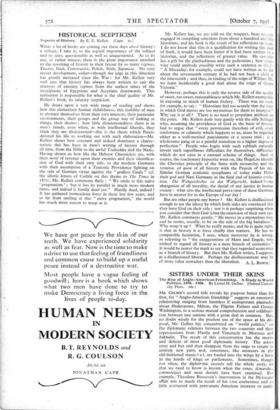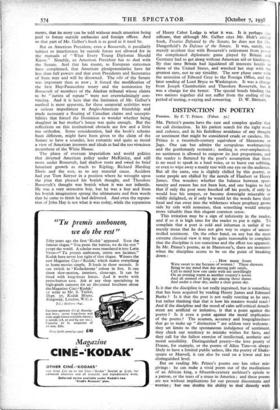SISTERS UNDER THEIR SKINS
The Rise of Anglo-American Friendship. A Study in World Politics, 1898-1906. By Lionel M. Gelber. (Oxford Univer- sity Press. 56s.) M. GELBER'S second title reveals his purpose better than his first, for " Anglo-American friendship " suggests an emotional relationship ranging from harmless if unimportant platitudes about Shakespeare, Milton, the Pilgrim Fathers and George Washington, to a serious mutual comprehension and collabora- tion between two nations with a great deal in common. But, no doubt wisely for the prudent use of the space at his dis- posal, Mr. Gelber has concentrated on " world politics," on the diplomatic relations between the two countries and their repercussions from Manila and Venezuela to Morocco and Sakhalin. The result of this concentration has the merits and defects of most good diplomatic history. The actors strut and fret and then disappear from the stage to return in entirely new parts and, sometimes, like amateurs in the old-fashioned music-1 a 1, are hauled into the wings by a hook in the hands of kings or parliaments. Sometimes, though not often, the diplomatic records tell the whole story, all that we need to know is known when the notes, dEmarches, communiqués and stout denials have been examined. For example,' Theodore Roosevelt's intervention in the Moroccan affair was so much the result of his cwn exuberance and so little connected with permanent American interests or senti-
ments, that its story can be told without much attention being paid to forces outside embassies and foreign offices. And so that part of Mr. Gelber's book is as good as it need be.
But an American President, even a Roosevelt, is peculiarly subject to interference by outside forces not allowed for in the manuals of " What Every Young Diplomat Should Know." Notably, an American President has to deal with the Senate. And that has meant, as European statesmen have complained, that American plenipotentiaries have far less than full powers and that even Presidents and Secretaries of State may and will be disowned. The role of the Senate was important then as now ; it forced the modification of the first Hay-Pauncefote treaty and the nomination by Roosevelt of members of the Alaskan tribunal whose claims to be " jurists of repute " were not overwhelmingly con- vincing. And it is here that the limitation of Mr. Gelber's method is most apparent, for these senatorial activities were a serious . impediment to Anglo-American friendship and made necessary a flouting of Canadian claims and suscepti- bilities that forced the Dominion to wonder whether being daughter in her mother's house was quite enough. But' the reflections on this institutional obstacle are few and a little too orthodox. Some consideration, had the book's scheme been different, might have been given to the claim of the Senate to have a sounder, less romantic and quite as moral a view of American interests and ideals as had the too vivacious incumbent of the White House.
The phase of overseas imperialism and world politics that diverted American policy under McKinley, and still more under Roosevelt, had shallow roots and owed its brief luxuriant growth as much to Kipling, Richard Harding Davis and the rest, as to any material cause. Accident had put Tom Sawyer in a position where he wrought upon the plan that pleased his boyish thought, and Theodore Roosevelt's thought was boyish when it was not infantile. He was a very attractive boy, but he was a boy and from his boyish imagination sprang the ultimatums and firm words that he came to think he had delivered. And even the reputa- tion of John Hay is not what it was today, while the reputation
of Henry Cabot Lodge is what it was. It is perhaps sig- nificant, that although Mr. Gelber cites Mr. Holes critical book, Treaties Defeated by the Senate, he does not list Mr. Dangerfield's In Defence of the Senate. It was, surely, not merely accident that with Roosevelt's retirement from power the complicated diplomatic game played by Britain and Germany had to get along without American aid or hindrance. By that time Britain had liquidated all interests hostile to those of the United States, and watched her step with the greatest care, not to say timidity. The new phase came with the accession of Edward Grey to the Foreign Office, and the later sending of Lord Bryce to Washington. It was a change from Joseph Chamberlain and Theodore Roosevelt, but it was a change for the bettef. The special bonds binding the two nations together did not suffer from the ending of the period of testing, x-raying and reweaving. D. W. BROGAN.















































 Previous page
Previous page